Biography of Aristotle: The Life and Ideas of a Legendary Philosopher

Aristotle was one of the greatest Greek philosophers, whose ideas have shaped Western thought for centuries. Born in 384 B.C. in Stagira, Northern Greece, Aristotle’s early exposure to the medical practices of his father, Nicomachus, laid the groundwork for his later pursuits in science and philosophy.
His journey took a significant turn when he moved to Athens and joined Plato’s Academy, where he developed his foundational philosophical ideas.
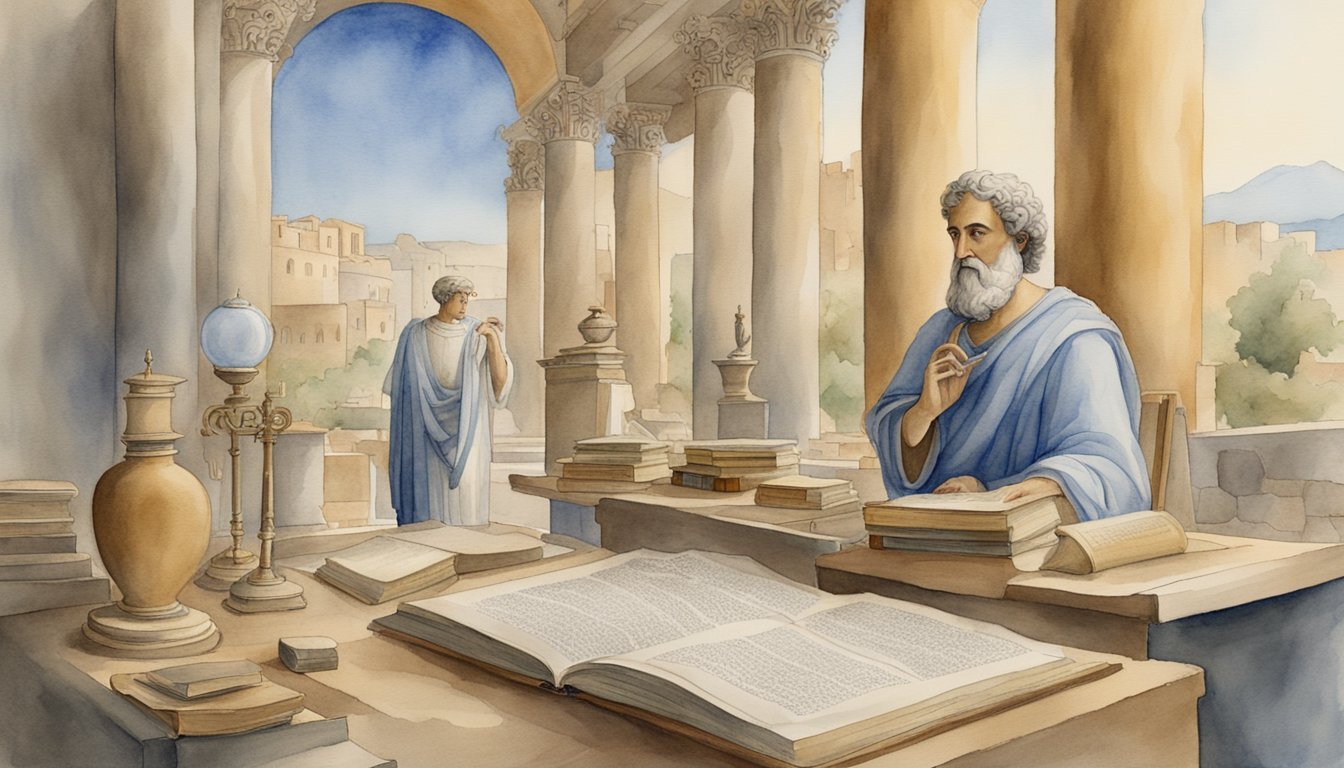
In Athens, Aristotle founded the Lyceum, where he taught and conducted research on various subjects, including logic, metaphysics, biology, and politics.
His influence extended to notable pupils like Alexander the Great, which helped spread his ideas far and wide.
Aristotle’s keen observations and writings covered a broad range of topics, making him a polymath whose teachings still resonate today.
For those intrigued by deeper philosophical knowledge, consider exploring this unique resource on spiritual knowledge.
Aristotle’s legacy continues to influence modern philosophy, science, and even political theory, reflecting his enduring impact on the world.
Key Takeaways
- Aristotle was a Greek philosopher who founded the Lyceum in Athens.
- His teachings covered diverse topics like logic, science, and politics.
- Aristotle’s legacy continues to influence modern thought and philosophy.
Early Life and Education
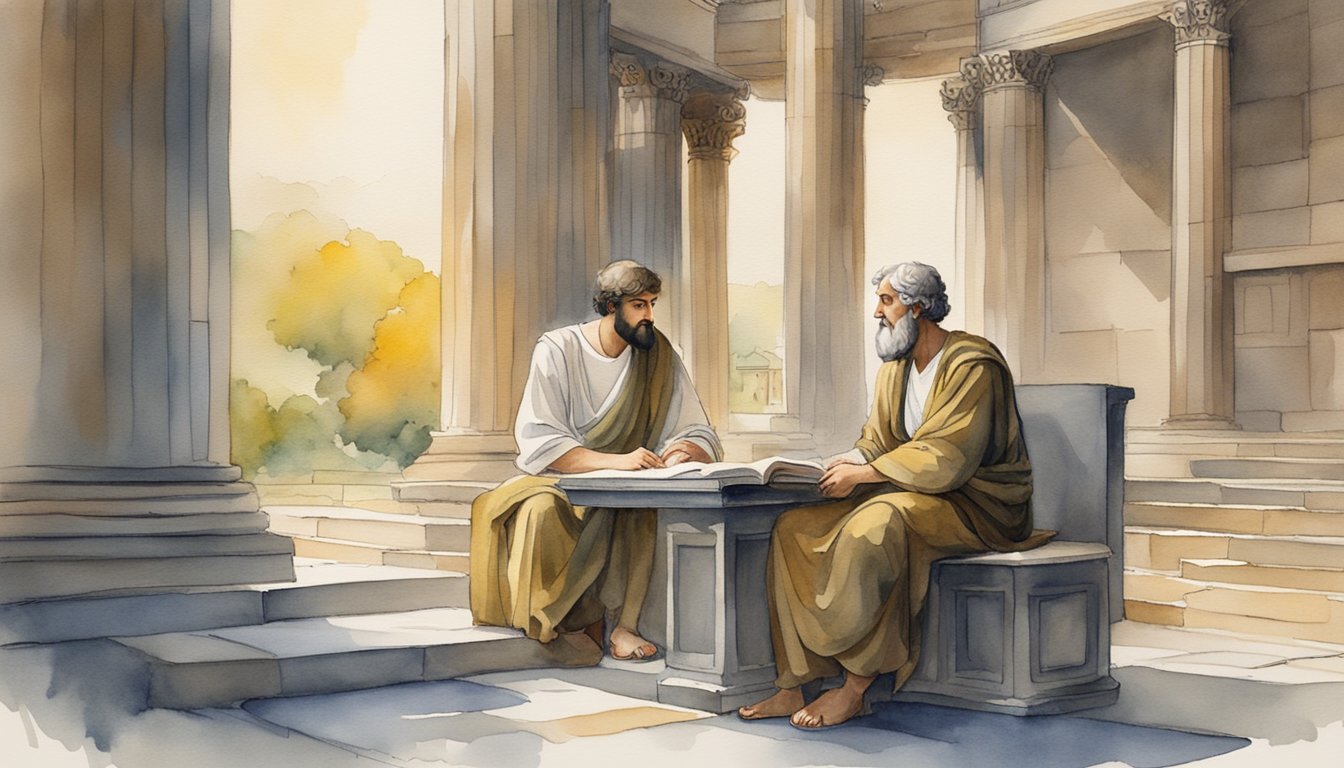
Aristotle’s journey began in a small town in Greece and continued in the vibrant city of Athens.
His early connection with medicine and later studies at Plato’s Academy shaped his thinking and philosophies.
Childhood in Stagira
Aristotle was born in 384 B.C. in Stagira, a small town on the northern coast of Greece.
His father, Nicomachus, served as the court physician to King Amyntas of Macedon.
Growing up in this environment gave Aristotle an early exposure to medical practices and a keen interest in science.
Stagira was a seaport town, and Aristotle’s early life there was influenced by both its bustling trade and scholarly connections.
His family’s status afforded him a quality education and introduced him to various intellectual circles early on.
Studies at Plato’s Academy
At the age of seventeen, Aristotle was sent to Athens to study at Plato’s Academy, which was the leading center of learning in the Greek world.
He studied there for twenty years, absorbing knowledge from Plato, one of the most influential philosophers of the time.
During his time at the Academy, Aristotle honed his skills in various fields, including metaphysics, ethics, and natural sciences.
The experience deeply influenced his thinking and helped him develop his own philosophical ideas, which later distinguished him from his teacher, Plato.
For more on Aristotle’s journey into secret spiritual knowledge, explore this link.
Throughout his years at the Academy, Aristotle maintained a close bond with Plato, despite eventually disagreeing on some philosophies.
His education there laid the groundwork for his future contributions to Western philosophy. 🎓
Time in Athens and the Lyceum
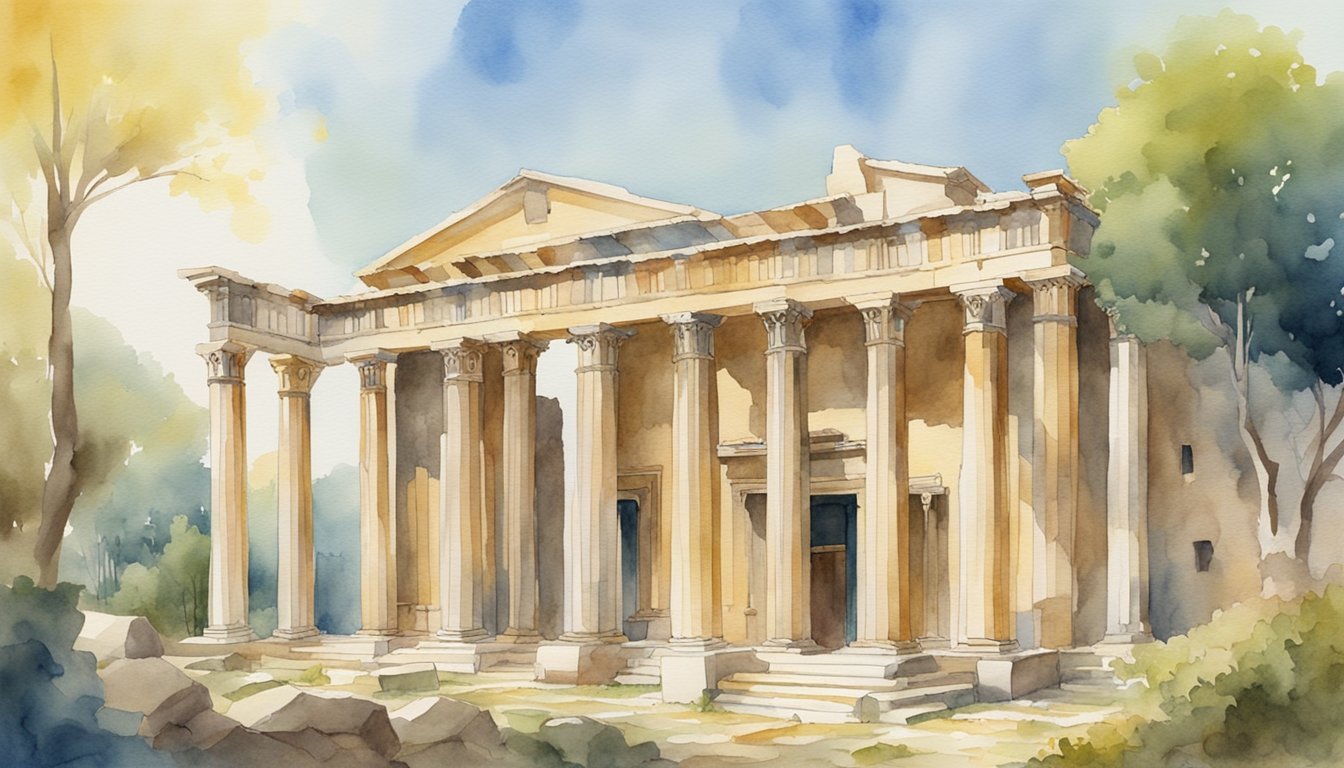
Aristotle, a brilliant teacher and philosopher, spent a significant period of his life in Athens where he founded the Lyceum.
He was deeply engaged in imparting knowledge and conducting research.
Founding the Lyceum
In 335 BCE, Aristotle established the Lyceum just outside the boundaries of Athens.
He chose a gymnasium already sacred to Apollo to set up this school.
The Lyceum became a hub for intellectual and physical activity, a place where young men could exercise both their bodies and minds.
Aristotle built an extensive library at the Lyceum.
He gathered a group of students who became known as “Peripatetics”.
This name came from Aristotle’s habit of walking around the peripatos, a covered walkway, while giving lectures.
Lectures and Teachings
Aristotle’s lectures at the Lyceum covered a broad range of topics including logic, rhetoric, metaphysics, and biology.
He had a unique teaching style that emphasized discussion and debate, encouraging his students to engage deeply with ideas.
The Lyceum also became a center for scientific research.
Aristotle and his students collected data on plants, animals, and other aspects of the natural world.
This meticulously gathered information laid the groundwork for many of Aristotle’s writings.
Many of his extant works are thought to be notes from these lectures.
His methods and philosophies influenced countless scholars and continue to be studied today.
For those seeking deeper knowledge, exploring secret spiritual knowledge can provide more insights into his time. 🌿
Aristotle’s Philosophical Concepts
Aristotle’s thoughts spanned many areas like logic, ethics, and metaphysics.
He developed systems that are foundational to Western philosophy.
Aristotelian Logic 🔍
Aristotle is well-known for his development of logic, especially the concept of the syllogism.
A syllogism is a form of reasoning where a conclusion is drawn from two given or assumed propositions (premises).
For example, “All humans are mortal.
Socrates is human.
Therefore, Socrates is mortal.”
He believed logic was a tool to be used to acquire knowledge.
His logical works are gathered in a collection called the Organon.
Aristotle’s logical system prioritized clarity and precision in thought.
Much of this work laid the groundwork for the science of logic.
Ethics and Virtues 🌟
In ethics, Aristotle is best known for his concept of virtue ethics.
He argued that virtues are habits and behaviors that enable individuals to achieve a good and fulfilling life.
Key virtues include courage, temperance, and justice.
He introduced the idea of the Golden Mean, the desirable middle ground between two extremes.
For example, courage is a mean between recklessness and cowardice.
Aristotle believed that achieving eudaimonia (happiness or flourishing) requires living a life of virtue.
His ethical theories are detailed in works like the Nicomachean Ethics.
Metaphysical Ideas 🌀
Aristotle’s metaphysical ideas focused on concepts of form and matter.
He rejected Plato’s theory of forms and instead argued that form and matter are inseparable.
He believed that everything in the world is made up of both form (the essence of a thing) and matter (the substance of which it is made).
Additionally, he explored the concept of potentiality and actuality.
For instance, an acorn has the potential to become an oak tree, and the oak tree is the actualization of the acorn’s potential.
Aristotle’s metaphysics laid the groundwork for many philosophical thoughts about existence and reality.
For more on the hidden spiritual knowledge Aristotle explored in his metaphysical pursuits, click here.
Scientific Explorations

Aristotle made significant contributions to biology and physics.
He viewed observation and systematic study as key to understanding the natural world.
Inquiry into Biology
Aristotle was fascinated by the diversity of life.
He carefully observed and documented various species, leading to crucial insights into their anatomy and behaviors. 🦋 He classified animals into groups based on their similarities, a method laying the groundwork for modern taxonomy.
He studied marine life extensively, as seen in his work “History of Animals.” Aristotle described and categorized over 500 species, noting details about their habitats, reproduction, and physical characteristics.
His observations on the anatomy of fish and cephalopods provided an early understanding of marine biology.
His approach stressed direct observation and described many biological processes accurately.
While some theories had flaws, Aristotle’s work inspired later scientists.
His influence reached medieval scholars, reshaping biology study patterns.
For those intrigued by unlocking spiritual knowledge, a secret awaits here.
Advancements in Physics
Aristotle’s contributions to physics were also significant.
He wrote extensively on the nature of motion, causality, and the elements. 🔬 He proposed that all physical substances are made up of a combination of earth, water, air, and fire.
In his view, every object moves due to its nature or an external force.
This theory differed from modern physics but laid the foundation for understanding motion.
He also explored concepts of potentiality and actuality, which are crucial to modern metaphysics.
Aristotle’s ideas on natural science formed a large part of his philosophical inquiry.
His text “Physics” examined light, heat, and sound, attempting to explain natural phenomena using logical analysis.
While not all his conclusions were correct, his methods promoted a systematic study of nature, influencing scientific exploration for centuries.
Aristotle and Politics
Aristotle was a key figure in the realm of politics.
His thoughts on political theory and government shape modern political thought.
Political Theory
Aristotle viewed politics as a means to create a good and virtuous life for citizens.
He elaborated on this in Nicomachean Ethics and Politics.
He believed that humans are naturally political animals, meaning they need communities and states to achieve their highest potential.
His observations blend practical experience with theoretical constructs.
In Politics, he classified different forms of government and examined their strengths and weaknesses.
His insights suggest that a balanced government, where laws and values align, allows for the best outcomes.
Aristotle’s idea of a good political community is one where institutions and citizens strive for virtue and happiness.
For more perspectives on Aristotle’s political concepts, visit the Stanford Encyclopedia of Philosophy.
Views on Government
Aristotle analyzed various types of government, including democracies, oligarchies, and monarchies.
He argued that the best government is a mix of these forms.
A stable government, he posited, prevents the concentration of power and promotes justice.
Aristotle also stressed the importance of laws.
He thought laws should be crafted to benefit the common good and encourage virtuous behavior.
Unlike his teacher Plato, Aristotle was pragmatic about politics, advocating real-world applications over theoretical ideals.
He emphasized that understanding and engaging with politics was essential for a fulfilling life.
A deeper dive into his political views can be found here 🏛️.
By examining the practical and theoretical aspects of political life, Aristotle remains a crucial figure in political philosophy.
Works and Writings
Aristotle made many significant contributions to various fields.
His prolific writing covered areas from philosophy to rhetoric and poetics, influencing thought for centuries.
Major Philosophical Works
Aristotle’s philosophical writings include some of his most important works.
The “Nicomachean Ethics”, named after his son, explores the concept of virtue and the path to a good life.
Another essential work, “Topics”, provides insights into constructing arguments and reasoning.
His writings have deeply influenced Western thought.
In “Metaphysics”, Aristotle discusses the nature of being and reality, tackling questions about existence and what it means to be. 📚 His approach was systematic, aiming to provide a comprehensive philosophical system that addressed both abstract and practical matters.
Contributions to Rhetoric and Poetics
Aristotle’s “Rhetoric” is a foundational text on the art of persuasion.
He analyzed how to construct effective arguments and recognize them in speeches.
The tools and techniques outlined in this work are still taught today in communication and debate classes.
In “Poetics”, Aristotle examines literary theory, particularly tragedy and epic poetry.
He discusses the elements that make a good story, such as plot, character, and theme.
His influence extends to literature, where many of his ideas are still relevant in understanding storytelling and dramatic arts. 🎭 He also delves into how stories evoke emotions and provide insights into human nature.
For those interested in exploring more of his works and other secret truths, check out some secret spiritual knowledge.
Influence and Legacy
Aristotle’s impact extends far beyond his own era, deeply shaping Western thought through various periods, including the Middle Ages and the Renaissance.
His ideas have continued to influence modern philosophy and science.
Impact on Western Thought
Aristotle’s work laid the foundations for many fields of study. 🤓 His writings in ethics, metaphysics, and logic became essential texts for scholars.
The Roman Empire embraced his ideas, helping spread his influence throughout Europe.
During the Middle Ages, Aristotle’s works were translated into Arabic and later Latin, becoming central to medieval scholarship.
The Renaissance saw a revival in Aristotelian thought, with thinkers turning to his works to challenge existing dogmas and explore new ideas.
In the Enlightenment, philosophers like John Locke and Immanuel Kant debated his concepts, pushing Western thought forward.
Aristotelianism Through the Ages
Aristotelianism refers to the traditions inspired by Aristotle’s philosophy. 🧠 During the Middle Ages, scholars like Thomas Aquinas integrated Aristotelian ideas with Christian theology, creating a powerful intellectual framework.
The Renaissance period marked another high point, as humanists examined Aristotle’s texts to support their inquiries in the arts and sciences.
This period saw the birth of humanism, emphasizing human potential and achievements.
In modern times, neo-Aristotelianism has emerged, blending old and new philosophical ideas.
Aristotle’s emphasis on empirical observation influenced scientific methods, impacting disciplines far beyond philosophy.
For those intrigued by secret spiritual knowledge, check out this unique source.
Aristotle’s legacy endures, influencing fields as diverse as political theory and natural science.
Personal Life and Relationships
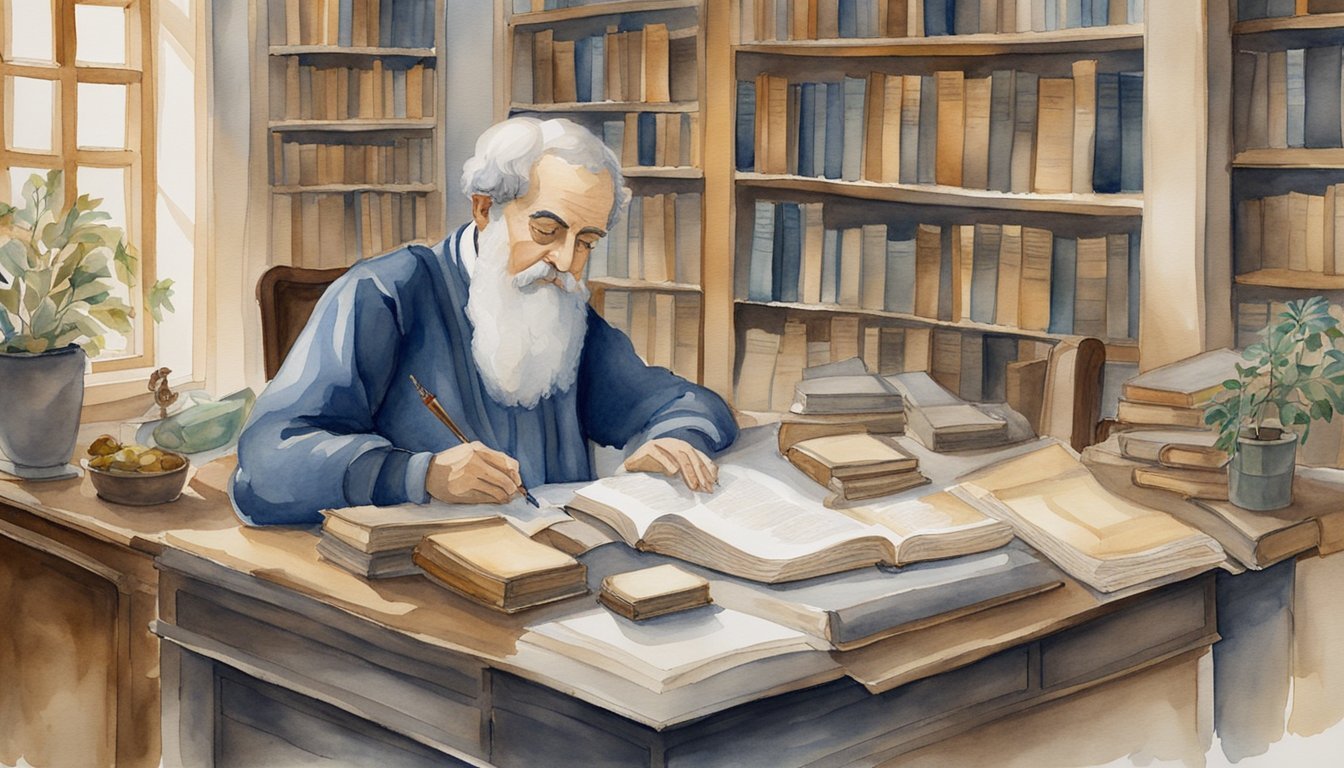
Aristotle’s personal life was marked by close bonds with friends and significant contributions to his family.
He was connected to some of the most influential thinkers of his time and maintained deep personal relationships.
Friendships and Contemporaries
Aristotle had many friends and contemporaries who played important roles in his life.
One of his closest friends was Hermias, a ruler in Asia Minor, who had a significant influence on his life and works.
It’s believed that Aristotle dedicated some of his writings to Hermias after his death.
Another important friend was Theophrastus, who followed Aristotle to Athens and became his brilliant disciple.
Aristotle’s relationship with Theophrastus was both personal and professional; he entrusted him with leading the Lyceum after his own death.
Throughout his life, Aristotle nurtured strong bonds with other philosophers.
His connection with Plato, his teacher, shaped much of his early thinking.
Although their philosophies diverged, Plato’s impact on Aristotle was profound.
Despite their philosophical differences, Aristotle respected and learned immensely from Plato’s work.
Family and Descendants
Aristotle married Pythias, the niece of his friend Hermias.
Together, they had a daughter also named Pythias.
His family life was integral to his existence, providing stability and support throughout his academic endeavors.
After Pythias’ death, Aristotle formed a relationship with Herpyllis, who bore him a son named Nicomachus.
Aristotle’s own works, particularly in ethics, reflect his deep concern for family and personal relationships.
Aristotle’s descendants continued his legacy, with Theophrastus maintaining the philosophical school Aristotle founded.
His family background and relationships are well-documented, emphasizing the personal side of a man known primarily for his intellectual achievements.🤔
Dive deeper into the secret spiritual knowledge that might have influenced thinkers like Aristotle here.
Pupils and Teaching Career
Aristotle was a significant teacher with many famous students.
He had unique ways of teaching that left a big mark on his students and philosophy.
Prominent Students
Aristotle’s most famous student was Alexander the Great.
Alexander went on to conquer much of the known world and spread Greek culture everywhere.
This influence was partly due to his teacher’s teachings, who provided him with a well-rounded education.
Another notable student was Theophrastus, who took over Aristotle’s school, the Lyceum.
Speusippus, Plato’s nephew, was also mentioned in some texts as a student.
These students went on to become significant figures in philosophy and science, continuing Aristotle’s legacy. 🌟
Methodologies of Instruction
Aristotle’s teaching methods were different from those of his teacher, Plato.
He founded the Peripatetic School, where he taught while walking with his students.
This method helped encourage open dialogue and critical thinking.
Subjects like logic, physics, politics, and ethics were taught.
His approach was more empirical, focusing on observation and data collection. Discover more about ancient teachings.
Aristotle also wrote many works to support his teaching.
These texts were used as primary sources of knowledge for centuries and influenced many areas of science and philosophy.
Final Years and Death
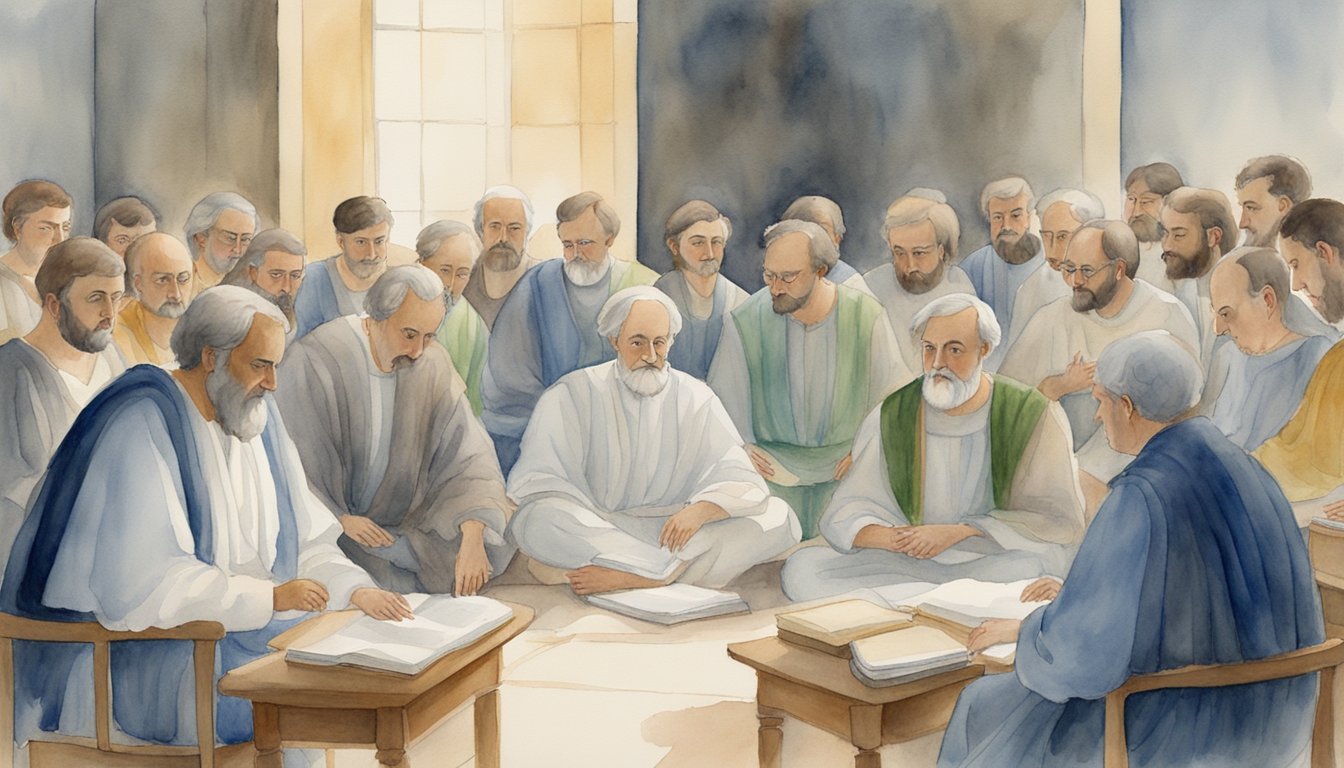
Aristotle’s final years were spent in Chalcis, away from the Anti-Macedonian sentiment in Athens.
He continued to teach and write until his death.
Last Works
In his last years, Aristotle focused on finalizing some of his major works.
He continued his teachings and writings at the Lyceum, covering areas like ethics, politics, and natural sciences.
During this period, he developed some of his major ideas that would influence Western thought for centuries.
Aristotle’s final years were marked by his engagement in profound philosophical issues.
These include revisiting and refining his earlier theories.
One notable aspect was his emphasis on ethics, analyzing human virtues and the concept of the “good life.”
Legacy and Farewell
Aristotle passed away in 322 BC in Chalcis.
He fled Athens due to the rising Anti-Macedonian sentiment, fearing for his safety because of his connections to Alexander the Great.
Despite his exile, his intellectual influence remained strong.
His teachings left a lasting impact on Western philosophy and science.
He was a monumental figure whose ideas shaped various fields.
Aristotle’s legacy lives on in philosophy, psychology, and even today’s modern sciences.
His final teachings continue to be a cornerstone in understanding human behavior and the natural world.
Those interested in exploring secret spiritual knowledge can still find inspiration in his works. 🌟






